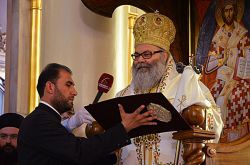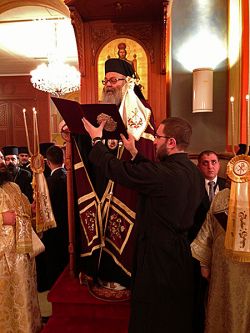Enthronization of John X, Patriarch of Antioch
There was a problem loading image 'images/stories/comunita/notizie/dalle chiese/JohnYazigi_600.jpg'
There was a problem loading image 'images/stories/comunita/notizie/dalle chiese/JohnYazigi_600.jpg'
The homily pronounced by patriarch John X on the occasion of his enthronization is a text that in a profoundly evangelical style
17 February 2013
On the occasion of his enthronization in the Holy Cross Church of Damascus on Sunday, 10 February, on 17 February His Beatitude John X presided at the divine liturgy in the St Nicholas Cathedral of Beirut. This Sunday in Lebanon, in the presence of many delegates of the Churches, invited by the Holy Synod, was repeated, so to say, a ceremony that had already taken place the previous Sunday in amore modest manner in war-torn Syria, in what is the see of the Orthodox patriarchate, Damascus. As a sign of the love that our community nurtures for this Church, a witness to the Gospel in Arab culture and among the people of Islam, one of our brothers as delegate of the prior was present at the ceremony.
With joy we recall that the Lord has made us the gift some months ago of meeting metropolitan Youhanna Yazigi, at that time archbishop of the Antiochian Orthodox diocese of Central and Western Europe, who had come to Bose with the St Ireneus Catholic-Orthodox theological study group, as its co-president. In this way were strengthened our ties with the Antiochan Church, which were forged through friendship with bishops, priests, monks, and the faithful of this Church and which had their roots in a deep tie of spiritual communion with patriarch Ignatius IV (1979–2012). Our community has published a book of interviews (Un amore senza finzioni, Qiqajon, 2006) with this great spiritual man, who returned to the Father’s house on 5 December.
The homily pronounced by patriarch John X on the occasion of his enthronization is a text that in a profoundly evangelical style exhorts the flock to follow the Lord’s will in all spheres: the church community, care for the poor, the involvement of youth, dialogue with the modern world, ecumenical relations, relations with the brothers of Islam, monastic life. Below we give ample passages from this discourse:
Beloved sons and daughters,
Jesus, the Emmanuel, is always present among us and is always with us, always ready to meet us. He has joy at our joys and rejoices at our holiness. He weeps at our tragedies and our sadness. He also weeps on account of our sloth, the sloth of pastors and flock in living according to his commandments. He also weeps when our sins cover his glorious face covered with blood and when these sins impede the world to find him through us in his Church …
The Lord will not be satisfied when he sees the unity he wanted among the sons and daughters of his people become fragile and when he sees his people divided. We together compose the people of God, a charismatic people, a holy nation, a royal priesthood. Each of us realizes in practice by serving others the gifts given him by the Spirit …
The Lord will not be content to see his Church, called to care for all, not taking sufficient interest in the poor, in his beloved little ones, and not considering them the primary object of its attentions and its activity. Jesus wants that no one may suffer poverty, seeing that we lack neither money nor opportunity. Why do we not remember what John Chrysostom, the great pastor who came from Antioch, recalled to each one of us: "You do not possess anything of what belongs to you, it is the property of others … it belongs to you and to your neighbor, like the sun, the air, and the earth” (Homilies on the Letter to the Corinthians, 20)?
Jesus suffers when he sees a large number of our children, especially young people, in confusion. He suffers when he sees them leaving the Church, submerged in a suffocating indifference. Regaining young people for Christ and for his Church should be one of our first priorities, just as we rejoice at the return of the prodigal son and invite him to take his place in the Church. Why do we not seek the real motives why our young people leave? Why do we not employ our pastoral care to reach them and convince them not only by word, but by a living liturgy and a teaching that returns us to the roots of our tradition and removes bureaucracy from some of our practices?
We must invent what will make them immerse themselves in a liturgy inspired by God, we must invent what will win them in it and make them see that it opens for them the doors to come to the heart of God and of their brethren…Young people are the Church’s wealth. They are ambassadors in this world in very rapid change. We want them to take seriously their role of ambassadors and to know that the entire Church has need of their enthusiasm and of the dedication of their entire life to reach their goal. We must make them understand their special place in the Church of Christ, who loved the rich young man and who was saddened at his departure. Young people are always rich on account of their modernity, their enthusiasm, and the great gifts received from God. We have need of them and lovingly we encourage them to work in the Church’s vineyard and to consider themselves responsible in it and for it, responsible together with all their brethren, especially those who watch over the care of the flock. If we love them as Christ loves, our relations with them become a relationship of fraternity, of love, and of mutual respect …
The Lord will not be satisfied in seeing us attached to the letter, rigid, without a breath of life. The Church lives in the Holy Spirit and can speak to all in all generations. Church tradition is not something sclerotic and rigid, repeated unconsciously; tradition is an instrument of salvation and of understanding the mystery of God. We live in an era that often rejects every tradition, and this has a negative influence on our young people. Our Church walks in time, because Christ wanted it to be his witness in every epoch. To walk in a world such as ours requires first of all that the dust which with the passage of time has covered our tradition be removed; it requires serious work so as to return to what stands at the root. Modernity is a grace that invites us to revive the origins of our liturgy and of our teaching and to distinguish between Sacred Tradition and the traditions to which we become attached because to pay attention only to the exterior and forget the life contained within. The witness of the Church in today’s world requires a discernment of modernity’s content, which has so many advantages … Our Church ought not to fear to make use of the instruments that render it capable of bringing its practices up to date and building bridges towards its people with words and ways understood by all … Finally, renewal is not realized solely in updating texts and making them readable in today’s language, but in renewing the human soul and its thoughts and in making this soul turn towards the face of Christ, who always looks at the last ones. In this way humanistic updating is united with man’s heart, giving birth to the salvation of what is human.
Monasticism has a great role in enlivening spiritual life and church renewal through spiritual oases, that is, the monasteries that God as permitted us to see revive in their dignity in the last fifty years, in this blessed Church that has known the birth of monasticism in the Church’s first centuries. We have need of monasteries in which is lived a fraternal life of communion in prayer, in asceticism, and in work, of monasteries capable of interceding in prayer. We are certain, in fact, that their prayer protects the world and what is in the world and strengthens the work in the Church’s vineyard …
Jesus doubtlessly weeps when he sees the Christian world divided and separated; he weeps when he sees ecumenism weakened in recent times. We must pray with Jesus and with all the brethren who belong to him "that they may be one” (Jn 17,1). We must also consider that this unity is a condition very necessary "so that the world may believe” (Jn 17,21) … We must work seriously so as to rebuild unity among the Churches, Eastern and Western, to revive practical cooperation among the faithful of these Churches, in pastoral work and service, to encourage dialogue for the sake of a better mutual acquaintance and to take courageous prophetic initiatives so that God may grant us, at a time that he wills, the grace of communion in the same chalice, so that thus we may answer those who ask about our faith: "Come and see” (Jn 1,46). Come and witness how our mutual love comes from our love for him who loved us first and who sacrificed himself for us.
God is not pleased when he sees our common life with those non-Christians who share with us the same homeland weaken for so many reasons, political or fundamentalist, because of us or of them. These fundamentalist reasons have nothing to do with religion. Love does not know fear or enmity, but is "magnanimous, well-wishing; it is not envious, it does not boast, it does not become puffed up with pride” (1Cor 13,4). Love is our symbol and our arms. We Antiochians are an Eastern Church whose roots are deep in our region and in our Arab East. We, with Muslims, our brothers, are the children of this land. In it the Lord has wanted us to be witnesses to his holy Name, and in it we must remain, encouraging co-existence with dignity and rejecting all hate, fear, and arrogance. Beloved Muslims, we and you are not only co-participants on earth and in destiny, we and you have built the culture of these lands and we have in common our culture and our history; for this reasons we must preserve this great patrimony. We are also co-participants in adoring the one God, the true God, Light of the earth and of the heavens …
My brethren, my children, our concern is to do God’s will… the goal of our See is that Jesus may not be ashamed of us. We must work with love and unity to arrive at this goal. Help us to arrive at this goal …
patriarch of Antioch
and of all the East


